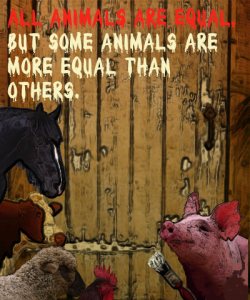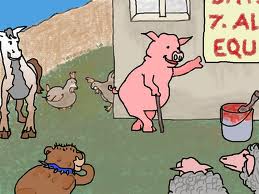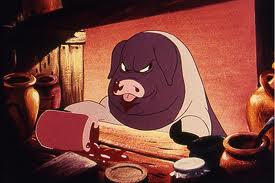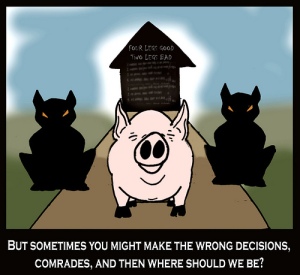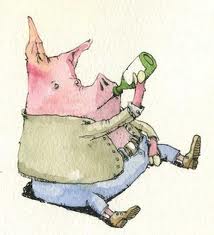From ‘Animal Farm’
by George Orwell (1903-1950)
Word had gone round during the day that old Major, the prize Middle White boar, had had a strange dream on the previous night and wished to communicate it to the other animals…
“Comrades, you have heard already about the strange dream that I had last night. But I will come to the dream later. I have something else to say first. I do not think, comrades, that I shall be with you for many months longer, and before I die, I feel it my duty to pass on to you such wisdom as I have acquired. I have had a long life, I have had much time for thought as I lay alone in my stall, and I think I may say that I understand the nature of life on this earth as well as any animal now living. It is about this that I wish to speak to you.
“Now, comrades, what is the nature of this life of ours? Let us face it: our lives are miserable, laborious, and short. We are born, we are given just so much food as will keep the breath in our bodies, and those of us who are capable of it are forced to work to the last atom of our strength; and the very instant that our usefulness has come to an end we are slaughtered with hideous cruelty. No animal in England knows the meaning of happiness or leisure after he is a year old. No animal in England is free. The life of an animal is misery and slavery: that is the plain truth.
“But is this simply part of the order of nature? Is it because this land of ours is so poor that it cannot afford a decent life to those who dwell upon it? No, comrades, a thousand times no! The soil of England is fertile, its climate is good, it is capable of affording food in abundance
to an enormously greater number of animals than now inhabit it. This single farm of ours would support a dozen horses, twenty cows, hundreds of sheep–and all of them living in a comfort and a dignity that are now almost beyond our imagining. Why then do we continue in this miserable condition? Because nearly the whole of the produce of our labour is stolen from us by human beings. There, comrades, is the answer to all our problems. It is summed up in a single word–Man. Man is the only real enemy we have. Remove Man from the scene, and the root cause of hunger and overwork is abolished for ever.
“Man is the only creature that consumes without producing. He does not give milk, he does not lay eggs, he is too weak to pull the plough, he cannot run fast enough to catch rabbits. Yet he is lord of all the animals. He sets them to work, he gives back to them the bare minimum that will prevent them from starving, and the rest he keeps for himself. Our labour tills the soil, our dung fertilises it, and yet there is not one of us that owns more than his bare skin. You cows that I see before me, how many thousands of gallons of milk have you given during this last year? And what has happened to that milk which should have been breeding up sturdy calves? Every drop of it has gone down the throats of our enemies. And you hens, how many eggs have you laid in this last year, and how many of those eggs ever hatched into chickens? The rest have all gone to market to bring in money for Jones and his men. And you, Clover, where are those four foals you bore, who should have been the support and pleasure of your old age? Each was sold at a year old–you will never see one of them again. In return for your four confinements and all your labour in the fields, what have you ever had except your bare rations and a stall?
“And even the miserable lives we lead are not allowed to reach their natural span. For myself I do not grumble, for I am one of the lucky ones. I am twelve years old and have had over four hundred children. Such is the natural life of a pig. But no animal escapes the cruel knife in the end. You young porkers who are sitting in front of me, every one of you will scream your lives out at the block within a year. To that horror we all must come–cows, pigs, hens, sheep, everyone. Even the horses and the dogs have no better fate. You, Boxer, the very day that those great muscles of yours lose their power, Jones will sell you to the knacker, who will cut your throat and boil you down for the foxhounds. As for the dogs, when they grow old and toothless, Jones ties a brick round their necks and drowns them in the nearest pond.
“Is it not crystal clear, then, comrades, that all the evils of this life of ours spring from the tyranny of human beings? Only get rid of Man, and the produce of our labour would be our own. Almost overnight we could become rich and free. What then must we do? Why, work night and day, body and soul, for the overthrow of the human race! That is my message to you, comrades: Rebellion! I do not know when that Rebellion will come, it might be in a week or in a hundred years, but I know, as surely as I see this straw beneath my feet, that sooner or later justice will be done. Fix your eyes on that, comrades, throughout the short remainder of your lives! And above all, pass on this message of mine to those who come after you, so that future generations shall carry on the struggle until it is victorious.
“And remember, comrades, your resolution must never falter. No argument must lead you astray. Never listen when they tell you that Man and the animals have a common interest, that the prosperity of the one is the prosperity of the others. It is all lies. Man serves the interests of no creature except himself. And among us animals let there be perfect unity, perfect comradeship in the struggle. All men are enemies. All animals are comrades.”
* * *
The pigs now revealed that during the past three months they had taught themselves to read and write from an old spelling book which had belonged to Mr. Jones’s children and which had been thrown on the rubbish heap. Napoleon sent for pots of black and white paint and led the way down to the five-barred gate that gave on to the main road. Then Snowball (for it was Snowball who was best at writing) took a brush between the two knuckles of his trotter, painted out MANOR FARM from the top bar of the gate and in its place painted ANIMAL FARM. This was to be the name of the farm from now onwards. After this they went back to the farm buildings, where Snowball and Napoleon sent for a ladder which they caused to be set against the end wall of the big barn. They explained that by their studies of the past three months the pigs had succeeded in reducing the principles of Animalism to Seven Commandments. These Seven Commandments would now be inscribed on the wall; they would form an unalterable law by which all the animals on Animal Farm must live for ever after. With some difficulty (for it is not easy for a pig to balance himself on a ladder) Snowball climbed up and set to work, with Squealer a few rungs below him holding the paint-pot. The Commandments were written on the tarred wall in great white letters that could be read thirty yards away. They ran thus:
THE SEVEN COMMANDMENTS
1. Whatever goes upon two legs is an enemy.
2. Whatever goes upon four legs, or has wings, is a friend.
3. No animal shall wear clothes.
4. No animal shall sleep in a bed.
5. No animal shall drink alcohol.
6. No animal shall kill any other animal.
7. All animals are equal.
* * *
It was about this time that the pigs suddenly moved into the farmhouse and took up their residence there. Again the animals seemed to remember that a resolution against this had been passed in the early days, and again Squealer was able to convince them that this was not the case. It was absolutely necessary, he said, that the pigs, who were the brains of the farm, should have a quiet place to work in. It was also more suited to the dignity of the Leader (for of late he had taken to speaking of Napoleon under the title of “Leader”) to live in a house than in a mere sty. Nevertheless, some of the animals were disturbed when they heard that the pigs not only took their meals in the kitchen and used the drawing-room as a recreation room, but also slept in the beds. Boxer passed it off as usual with “Napoleon is always right!”, but Clover, who thought she remembered a definite ruling against beds, went to the end of the barn and tried to puzzle out the Seven Commandments which were inscribed there. Finding herself unable to read more than individual letters, she fetched Muriel.
“Muriel,” she said, “read me the Fourth Commandment. Does it not say something about never sleeping in a bed?”
With some difficulty Muriel spelt it out.
“It says, ‘No animal shall sleep in a bed with sheets,”‘ she announced finally.
Curiously enough, Clover had not remembered that the Fourth Commandment mentioned sheets; but as it was there on the wall, it must have done so. And Squealer, who happened to be passing at this moment, attended by two or three dogs, was able to put the whole matter in its proper perspective.
“You have heard then, comrades,” he said, “that we pigs now sleep in the beds of the farmhouse? And why not? You did not suppose, surely, that there was ever a ruling against beds? A bed merely means a place to sleep in. A pile of straw in a stall is a bed, properly regarded. The rule was against sheets, which are a human invention. We have removed the sheets from the farmhouse beds, and sleep between blankets. And very comfortable beds they are too! But not more comfortable than we need, I can tell you, comrades, with all the brainwork we have to do nowadays. You would not rob us of our repose, would you, comrades? You would not have us too tired to carry out our duties? Surely none of you wishes to see Jones back?”
* * *
Four days later, in the late afternoon, Napoleon ordered all the animals to assemble in the yard. When they were all gathered together, Napoleon emerged from the farmhouse, wearing both his medals (for he had recently awarded himself “Animal Hero, First Class”, and “Animal Hero, Second Class”), with his nine huge dogs frisking round him and uttering growls that sent shivers down all the animals’ spines. They all cowered silently in their places, seeming to know in advance that some terrible thing was about to happen.
Napoleon stood sternly surveying his audience; then he uttered a high-pitched whimper. Immediately the dogs bounded forward, seized four of the pigs by the ear and dragged them, squealing with pain and terror, to Napoleon’s feet. The pigs’ ears were bleeding, the dogs had tasted blood, and for a few moments they appeared to go quite mad. To the amazement of everybody, three of them flung themselves upon Boxer. Boxer saw them coming and put out his great hoof, caught a dog in mid-air, and pinned him to the ground. The dog shrieked for mercy and the other two fled with their tails between their legs. Boxer looked at Napoleon to know whether he should crush the dog to death or let it go. Napoleon appeared to change countenance, and sharply ordered Boxer to let the dog go, whereat Boxer lifted his hoof, and the dog slunk away, bruised and howling.
Presently the tumult died down. The four pigs waited, trembling, with guilt written on every line of their countenances. Napoleon now called upon them to confess their crimes. They were the same four pigs as had protested when Napoleon abolished the Sunday Meetings. Without any further prompting they confessed that they had been secretly in touch with Snowball ever since his expulsion, that they had collaborated with him in destroying the windmill, and that they had entered into an agreement with him to hand over Animal Farm to Mr. Frederick. They added that Snowball had privately admitted to them that he had been Jones’s secret agent for years past. When they had finished their confession, the dogs promptly tore their throats out, and in a terrible voice Napoleon demanded whether any other animal had anything to confess.
The three hens who had been the ringleaders in the attempted rebellion over the eggs now came forward and stated that Snowball had appeared to them in a dream and incited them to disobey Napoleon’s orders. They, too, were slaughtered. Then a goose came forward and confessed to having secreted six ears of corn during the last year’s harvest and eaten them in the night. Then a sheep confessed to having urinated in the drinking pool–urged to do this, so she said, by Snowball–and two other sheep confessed to having murdered an old ram, an especially devoted follower of Napoleon, by chasing him round and round a bonfire when he was suffering from a cough. They were all slain on the spot. And so the tale of confessions and executions went on, until there was a pile of corpses lying before Napoleon’s feet and the air was heavy with the smell of blood, which had been unknown there since the expulsion of Jones…
A few days later, when the terror caused by the executions had died down, some of the animals remembered–or thought they remembered–that the Sixth Commandment decreed “No animal shall kill any other animal.” And though no one cared to mention it in the hearing of the pigs or the dogs, it was felt that the killings which had taken place did not square with this. Clover asked Benjamin to read her the Sixth Commandment, and when Benjamin, as usual, said that he refused to meddle in such matters, she fetched Muriel. Muriel read the Commandment for her. It ran: “No animal shall kill any other animal WITHOUT CAUSE.” Somehow or other, the last two words had slipped out of the animals’ memory. But they saw now that the Commandment had not been violated; for clearly there was good reason for killing the traitors who had leagued themselves with Snowball.
* * *
It was a few days later than this that the pigs came upon a case of whisky in the cellars of the farmhouse. It had been overlooked at the time when the house was first occupied. That night there came from the farmhouse the sound of loud singing, in which, to everyone’s surprise, the strains of ‘Beasts of England’ were mixed up. At about half past nine Napoleon, wearing an old bowler hat of Mr. Jones’s, was distinctly seen to emerge from the back door, gallop rapidly round the yard, and disappear indoors again. But in the morning a deep silence hung over the farmhouse. Not a pig appeared to be stirring. It was nearly nine o’clock when Squealer made his appearance, walking slowly and dejectedly, his eyes dull, his tail hanging limply behind him, and with every appearance of being seriously ill. He called the animals together and told them that he had a terrible piece of news to impart. Comrade Napoleon was dying!..
By the evening, however, Napoleon appeared to be somewhat better, and the following morning Squealer was able to tell them that he was well on the way to recovery. By the evening of that day Napoleon was back at work, and on the next day it was learned that he had instructed Whymper to purchase in Willingdon some booklets on brewing and distilling. A week later Napoleon gave orders that the small paddock beyond the orchard, which it had previously been intended to set aside as a grazing-ground for animals who were past work, was to be ploughed up. It was given out that the pasture was exhausted and needed re-seeding; but it soon became known that Napoleon intended to sow it with barley…
A few days later Muriel, reading over the Seven Commandments to herself, noticed that there was yet another of them which the animals had remembered wrong. They had thought the Fifth Commandment was “No animal shall drink alcohol,” but there were two words that they had forgotten. Actually the Commandment read: “No animal shall drink alcohol TO EXCESS.”
* * *
One day in early summer Squealer ordered the sheep to follow him, and led them out to a piece of waste ground at the other end of the farm, which had become overgrown with birch saplings. The sheep spent the whole day there browsing at the leaves under Squealer’s supervision. In the evening he returned to the farmhouse himself, but, as it was warm weather, told the sheep to stay where they were. It ended by their remaining there for a whole week, during which time the other animals saw nothing of them. Squealer was with them for the greater part of every day. He was, he said, teaching them to sing a new song, for which privacy was needed.
It was just after the sheep had returned, on a pleasant evening when the animals had finished work and were making their way back to the farm buildings, that the terrified neighing of a horse sounded from the yard. Startled, the animals stopped in their tracks. It was Clover’s voice. She neighed again, and all the animals broke into a gallop and rushed into the yard. Then they saw what Clover had seen.
It was a pig walking on his hind legs.
Yes, it was Squealer. A little awkwardly, as though not quite used to supporting his considerable bulk in that position, but with perfect balance, he was strolling across the yard. And a moment later, out from the door of the farmhouse came a long file of pigs, all walking on their hind legs. Some did it better than others, one or two were even a trifle unsteady and looked as though they would have liked the support of a stick, but every one of them made his way right round the yard successfully. And finally there was a tremendous baying of dogs and a shrill crowing from the black cockerel, and out came Napoleon himself, majestically upright, casting haughty glances from side to side, and with his dogs gambolling round him.
He carried a whip in his trotter.
There was a deadly silence. Amazed, terrified, huddling together, the animals watched the long line of pigs march slowly round the yard. It was as though the world had turned upside-down. Then there came a moment when the first shock had worn off and when, in spite of everything-in spite of their terror of the dogs, and of the habit, developed through long years, of never complaining, never criticising, no matter what happened–they might have uttered some word of protest. But just at that moment, as though at a signal, all the sheep burst out into a tremendous bleating of–
“Four legs good, two legs BETTER! Four legs good, two legs BETTER! Four legs good, two legs BETTER!”
It went on for five minutes without stopping. And by the time the sheep had quieted down, the chance to utter any protest had passed, for the pigs had marched back into the farmhouse.
Benjamin felt a nose nuzzling at his shoulder. He looked round. It was Clover. Her old eyes looked dimmer than ever. Without saying anything, she tugged gently at his mane and led him round to the end of the big barn, where the Seven Commandments were written. For a minute or two they stood gazing at the tatted wall with its white lettering.
“My sight is failing,” she said finally. “Even when I was young I could not have read what was written there. But it appears to me that that wall looks different. Are the Seven Commandments the same as they used to be, Benjamin?”
For once Benjamin consented to break his rule, and he read out to her what was written on the wall. There was nothing there now except a single Commandment. It ran:
ALL ANIMALS ARE EQUAL
BUT SOME ANIMALS ARE MORE EQUAL THAN OTHERS
* * *
